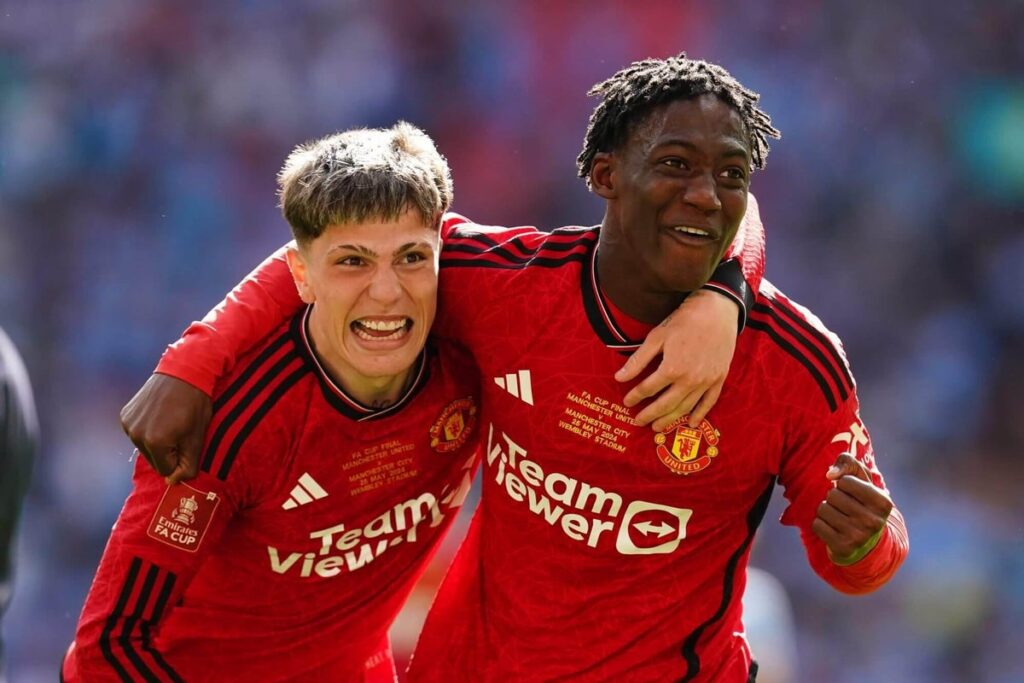
Mainoo and Garnacho’s futures will test INEOS’ strategy – and trust with supporters
If you want a football fanbase to be stirred, suggest that some of the best young players could be sold as happened at Manchester United this week. Fans didn’t like it but there are several layers to this, several different and often conflicting reasons.
First, every United player has their price and always have, even when it didn’t feel like it because United rose to being almost at the top of the market. It doesn’t mean players are leaving, especially if they’re under a long contract, but I used the word ‘almost’ because even when United were the reigning English, European and world champions, the best player still left for Real Madrid. Cristiano Ronaldo had a price, a world record fee, paid up front. And even that looked a bargain a decade later.
Offered a straight choice between the two, Raphael Varane chose Madrid as well. There are cultural, historical and financial reasons why footballers chose Madrid and it’s hard to deny that both decisions weren’t vindicated, yet United don’t do badly in the transfer hierarchy and it has long been so.
Amid the Molineux misery on Boxing Day, a veteran Wolves fan told me of his mixed feelings that the best player from the area, Duncan Edwards, dreamed of joining United and not Wolves. Bobby Charlton wanted to join United when he had another great United on his doorstep: Newcastle. Everton lost lifelong fan Wayne Rooney to Old Trafford when he was in his teens.
In 2000, chief executive Peter Kenyon told me that it was down to United and Real Madrid as the two main forces in world football — on the pitch and off it. It made sense at the time. In 2013, Ed Woodward told me that United wouldn’t be beaten for price going for any player. Such were the club’s revenues at the top of the English football tree, that was also believable. Clearly, the parameters have moved and not in United’s favour.
Be it going up against state-owned clubs, financial fair play rules or United’s own profligacy, the Glazers went to market and announced a strategic review in November 2022 because they couldn’t afford to carry on. United were losing too much money and were under too much debt because of mistakes on their watch. A team with the wage bill of a top-end Champions League side were consistently falling well short of that level. The workforce was too big, the players’ contracts relative to their achievements too.
Someone had to step in but the Glazers held the cards. So they’ve pulled this odd deal off and Sir Jim Ratcliffe, a man who loves a deal, is now the one making cuts and getting the heat for it. For reasons Ratcliffe knows best, he’s chosen to buy into a massive headache, but whatever the rights and wrongs of the decisions he makes, his aim is to make United great again and he’s been public about winning the title again by 2028.
Ratcliffe has much to sort out at Man Utd (Photo: Plumb Images/Leicester City FC via Getty Images)
Football has been an expensive folly for many businessmen who thought they knew best. Maybe Ratcliffe and those around him do, maybe future riches will abound, but for now it’s expensive, time-consuming, brings media scrutiny and it has been a bumpy ride. Ratcliffe knows there will be more painful decisions, but he also knows you don’t become the best by selling your finest players.
It’s true that United are in the midst of some very difficult negotiations. There are players among the best paid in football who don’t justify their status. You have others asking for more than they should be worth. That’s subjective and negotiations follow, but United haven’t been good at them. When Scott McTominay went to Naples in August, a major reason was because he was homegrown and one of the few players who could realise a hefty fee.
Some fans were sad to see him go and manager Erik ten Hag didn’t want him sold, but he was. A less publicised matter is that United felt McTominay would be asking for a lot more than he was on. If Kobbie Mainoo or Alejandro Garnacho left right now there would be a stronger fan reaction — yet we have no evidence the club are actively trying to sell them. The Athletic reported this week that United would reluctantly consider it if suitable offers arrive.
United, at some point, have to be stronger in negotiations. I spoke to the sports director of a leading club recently and he was critical of the Old Trafford hierarchy giving young players huge contracts too soon. He said it was better to lose a young player rather than give them an amazing contract before they’ve won anything since United have, in the past, created young players on vast salaries without the sufficient desire to succeed.
Two deals were concluded two this week — contract extensions for Harry Maguire and Amad. United were keen to get the Amad deal done and did so on Thursday. He gets a significant pay rise. Maguire stayed on the same money, more or less after a clause was activated by the club, but both decisions were rightly welcomed by fans.
Had I written that two years ago, I would have been laughed at. Maguire’s stock was low and he was getting constant social media abuse. Amad, despite his young age, was viewed as a mystifying, overpriced flop. Times change and fans are still getting used to the idea that United have got pressing money issues.

Garnacho and Mainoo, pictured with Rasmus Hojlund, have been two of United’s brightest sparks in recent years (Photo: Martin Rickett/PA Images via Getty Images)
The structure of Manchester United doesn’t help; the debts incurred by the Glazers, the dividends they extract, but it’s also true that if you’re winning everything, then the money follows. United would not have had to cut so many staff if the team were at the level they were at between 1993-2013.
The idea of Mainoo, 19, or Garnacho, 20, leaving unnerves fans for several reasons. They’re seen as the future of the club in an idealised version of how things will work out where they reach their full potential and become world beaters. Mainoo’s contract, which includes an option to extend by 12 months, expires in the summer of 2027, with the deal Garnacho signed last year running until June 2028.
There’s another factor here: the club’s history. United fans are rightly proud that one of the academy graduates has featured in nearly 4,000 consecutive games. Indeed the words ‘Youth. Courage. Success’ are there painted in red on the stairs right in front of where Ratcliffe works when he’s at the Carrington training ground. Youth and United are intertwined, a point to be proud of.
Mainoo, like Marcus Rashford, is a Mancunian United fan. These things matter in an increasingly globalised, transactional, world. It doesn’t mean any player should start games because he was born close to the water of the Irwell than Ipanema, but it’s a factor which separates United from the rest. Whoever is on the watch, if or when they break that record, will get criticised for it. Will it be Ruben Amorim, who has just claimed that he is very happy with ‘the guys from the academy’?
Ratcliffe also needs to earn the trust of United fans. He enjoyed a fair wind of support when he took over, but that isn’t normal since those in charge have long been criticised by United fans, even when the team was winning everything.
The decision-makers have long been the scapegoats for fans, just as fans now feel they are being made scapegoats for bad decisions made by the Glazers. The £66 headlines for tickets were awful PR for United and future ticket prices remain a big issue, while other decisions have been welcomed — money going into Carrington, the future of Old Trafford being brought to the table. Fans also welcomed what they saw as a proper football structure, though that idea was dented when Dan Ashworth left the club having been so heavily courted.
It’s fine to be sceptical about INEOS and their decisions until they’ve won the trust of supporters, but fans can play their part too. When I hear terms like ‘break the bank’ and ‘pay them what they ask for’ regarding popular players, it’s naive. Fans are paying those wages.
Fans might want to think otherwise, but players do what is right for players. Mark Hughes was United’s star centre-forward when he joined Barcelona in 1986. He has since spoken of his regret but it was his decision to leave and he earned many times what he was on at Old Trafford. That was his choice, but how it played out in the media was very different, with chairman Martin Edwards getting the brunt of the blame for a version of events that he strongly disputed, just as Ratcliffe has by some United fans — despite not having any specific plan to offload star young players.
I asked Edwards years later about his version of what went on with Hughes.
“The only way Hughes would sign another contract was with a get-out clause allowing him to leave,” said the former United chairman. “If we hadn’t given him a contract, he would have gone for nothing. I put a clause in for £1.8million and I did that to protect Manchester United. I didn’t want Mark Hughes to go, United didn’t want him to go, but Mark Hughes decided to go. That never came over in the media and I got all the stick. Maybe he had committed to Barcelona halfway through the 1985-86 season and maybe by the end he didn’t want to go, but he’d signed a deal with them.”
Players play the fans, media play the fans and rival clubs also seek to sow discord at Manchester United. That discord is more apparent when the team are struggling, but both Mainoo and Garnacho have sensible people around them. And sensible is not a word anyone could use to describe United’s transfers over the past 12 years.
(Photo: John Walton/PA Images via Getty Images)


![EURUSD Futures (6E Mar 2025): Key Price Levels for Traders Today [Jan 02, 2025]](https://weightedaverage.fun/wp-content/uploads/2025/01/EURUSD-Futures-6E-Mar-2025-Key-Price-Levels-for-Traders.jpg)

